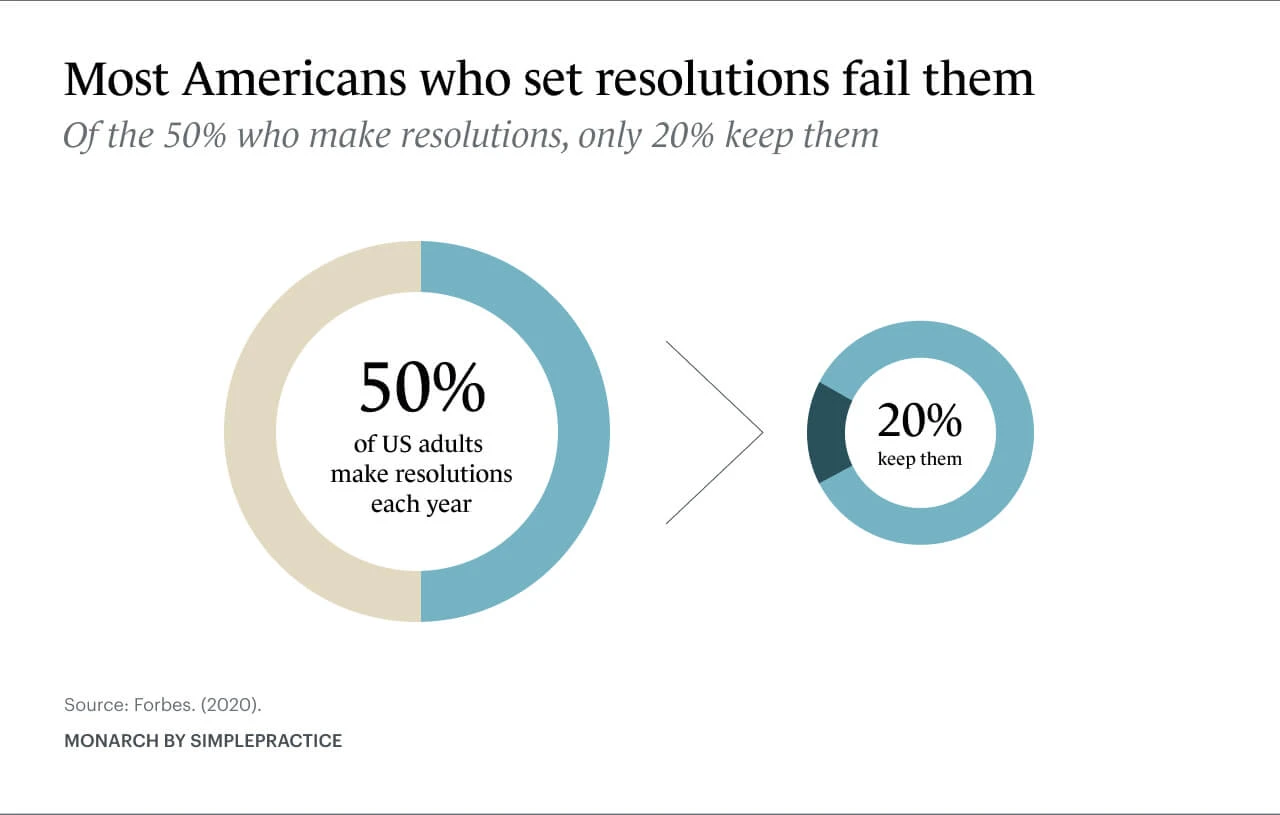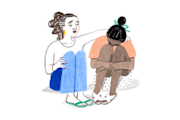‘Tis the season to make our New Year’s resolutions for the year ahead. Or, should we skip them this year?
Contrary to what you may have heard, New Year’s resolutions can be a powerful tool for reaching our goals.
Do New Year's resolutions actually get results? Can making a New Year's resolution help us reach our goals and change our lives in an impactful way?
Contrary to what you may have heard, New Year’s resolutions can be a powerful tool for reaching our goals.
Consider the numbers. Approximately 40% of U.S. adults make New Year’s resolutions each year. That’s about 80 million of us.
Research suggests that those who set New Year’s resolutions are more likely to achieve their goals, as compared to people who don't make resolutions.
Americans’ resolutions are primarily focused on improving our physical and mental health. So, millions of people are committing to address and change serious health issues. That’s impressive.
And, while studies have found that only between 10%-50% of resolutions are successful, it still means somewhere between 8 and 40 million Americans succeed at improving their health each year by sticking to their resolutions.
Finally, research suggests that people who set New Year’s resolutions are more likely to achieve their goals, compared to those who don't make resolutions.
So, let’s do this!
Below is study-backed advice on how to create a New Year’s resolution that works, along with examples of the types of resolutions that typically fail. We'll also look at the science and history of making New Year's Resolutions.
Should I even bother with a New Year’s resolution?
After going through almost three years of the global COVID-19 pandemic and its collective trauma, you may find yourself wondering whether it's even worth it to set goals and resolutions for the year ahead when we may have no idea what will happen in the coming months?
“The new year stands before us, like a chapter in a book, waiting to be written.” –Melody Beattie
As a therapist, do I believe it's worth it to create a New Year's resolution?
My answer is a resounding YES!
Why? Because of hope.
Hope is the belief that something different can happen, even in the face of life’s difficulties, and I have hope.
(Well, at least I hope to make New Year’s resolutions. I’m not always so hopeful about being able to follow through and stick with them.)
The history of New Year's resolutions
The custom of creating New Year’s resolutions dates back 4,000 years, however they gained popularity during the 17th century and have been a holiday tradition ever since.
The custom of creating New Year’s resolutions dates back 4,000 years. They gained popularity in the 17th century.
Why we make resolutions to celebrate the new year
On New Year's Eve it’s fun to gather with friends and family, to celebrate together and countdown the hours and minutes left until we turn the page on the calendar and a new year dawns.
As midnight approaches we may contemplate the miracle of a new year ahead full of promises and aspirations.
Starting a brand new calendar or appointment book may deliver hope that anything is possible.
As midnight approaches we may contemplate the miracle of a new year ahead full of promises and aspirations.
And we may announce our resolutions to our friends and family as we celebrate together our intentions and hope for the days and months ahead.
Most popular New Year's resolutions
The majority of New Year's resolutions are focused on improving our physical and mental health.
The top two resolutions for Americans in 2021 were improving fitness and losing weight.
For example, most popular New Year's resolutions involve weight loss, eating better, exercising more, saving more money, achieving a career goal, or spending less time doomscrolling social media and news headlines on our mobile phones.
In fact, the top two resolutions, shared by over half of Americans in 2021, according to Statista, were improving fitness and losing weight.
How many New Year's resolutions work and get results?
If you’re like the approximately 50% of Americans who make New Year’s resolutions each year, then you’re probably also part of the 80% who fail to keep those resolutions.

I don’t doubt that most people who create resolutions have good intentions when they make them.
But, what is behind the astonishing number of New Year's that fail so quickly before January is even half over?
Why most New Year's resolutions fail
There are many reasons our New Year’s goals may falter.
Perhaps the goals we set were too difficult, or maybe we got bored or lost interest and focus on following through. What’s really behind the success and failure of our New Year’s goals? What makes us more—or less—likely to succeed at these goals?
The problem of false hope
A key reason why most New Year's resolutions fail may be found in “false hope syndrome.”
False hope is a problem of unrealistic expectations. When we set New Year’s goals, are we realistically weighing what changes we need to make to get our desired outcome?
Think about someone you know (maybe it's you!) who set a resolution to lose ten or twenty pounds in the new year.
How much work do you think they (or you) will put into achieving this goal?
How quickly do they (or you) expect the weight to fall off?
How easy will it be and how will their life (or yours) be changed while trying to achieve this goal?
An essential issue here is our insufficient estimate of the process of self-change.
Enacting real change requires that we assess our ability to change our behaviors to the extent needed to achieve our goals.

Is there a way that we can get better at creating New Year's resolutions we can actually achieve? Consider these tips...
How to set realistic, measurable New Year's resolutions
Although you may get excited about all the possibilities for the year ahead, consider being practical and creating a SMART New Year's resolution.
Create SMART resolutions
SMART is an acronym describing goals, and it stands for:
Specific
Measurable
Realistic
Achievable
Time-bound.
Consider whether your resolution checks all five of those boxes.
For example, if your New Year's resolution is to "get into better shape," that resolution is actually too non-specific and vague to be measurable.
Instead you might say: "I'd like to be able to run one mile by February 10." Then you have something you can work up to week-by-week, and measure your progress. Or perhaps your New Year's resolution is "to hit the gym more often." This is also a bit too vague.
How often were you actually going to the gym in the previous year?
If it's two times per week, perhaps you make a resolution to increase to three or four times per week.
If you were going to the gym, in reality, zero times per week this past year, perhaps your New Year's resolution is to start going to the gym one day a week each week starting in January and February.
Focus on more attainable short-term goals and accept that the change won’t be comfortable—some days it may be downright hard.
Work on one goal at a time
Setting too many New Year's resolutions can set you up for failure.
If your goals are to go to the gym, stop drinking alcohol, and spend less time on your mobile phone, start with whichever you believe is most essential.
Once you are in a comfortable place with one goal, move on to the next. Remember, this isn’t a race.
Expect and plan for setbacks
Nothing worth achieving is ever easy, and it's crucial to expect some obstacles while you are doing the difficult work to change your habits and behaviors.
Knowing that the pink cloud (feelings of euphoria and excitement) of creating New Year's resolutions will dissipate during your daily journey is half the battle.
Make sure to elicit support from your friends and family during your voyage of change.
It may not be easy, but results from a study of about 300 people published in the Journal of Clinical Psychology showed that those who set New Year’s resolutions are ten times more likely to achieve their goals, as compared to people who did not make resolutions.
Last but not least, remember that change doesn’t have to be restricted to the New Year.
Any day of the year is a perfect day to start the process of self-change, self-development, and to establish healthy self-care routines, including starting counseling or therapy.
READ NEXT: How to Build Your Self-Esteem
Find a therapist near you. Check out the Monarch Directory by SimplePractice to find licensed therapists with availability and online booking.




